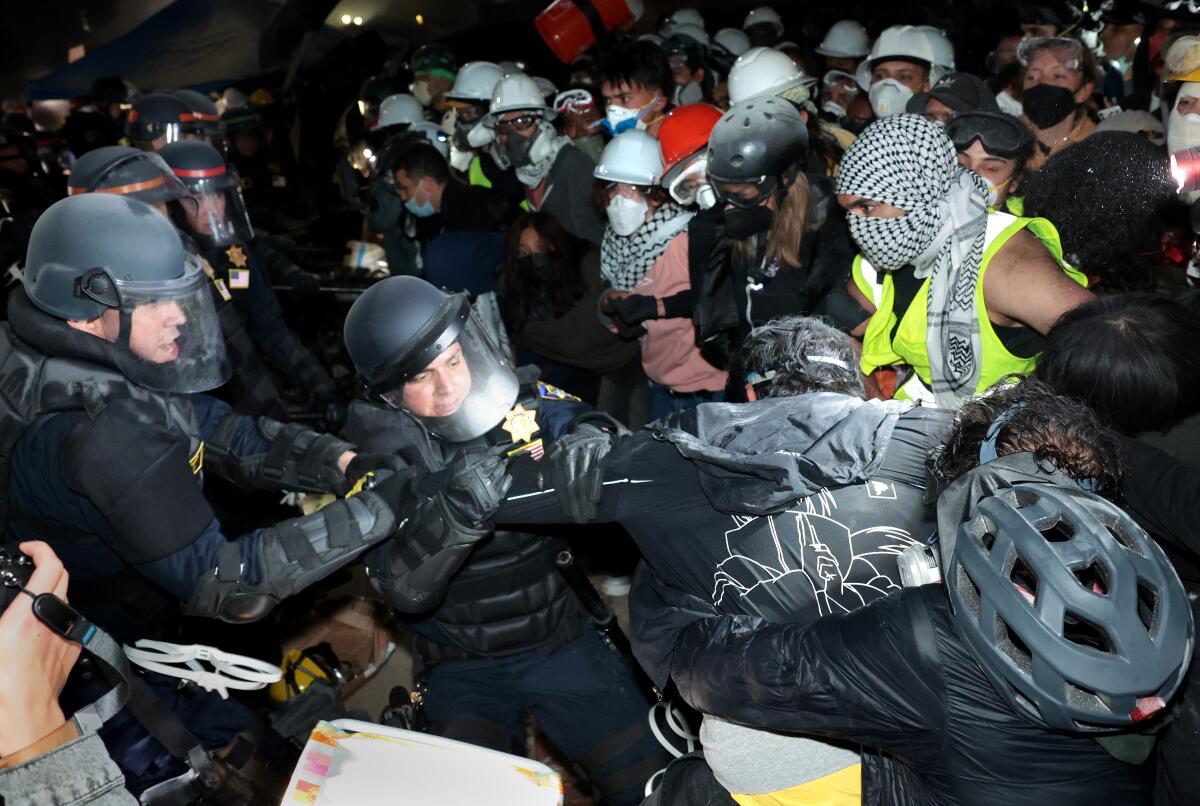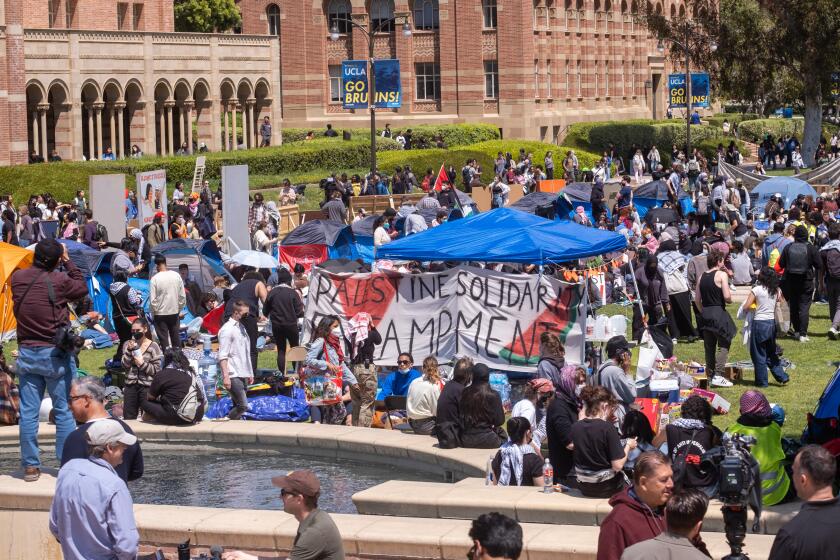UC unveils steep price tag for handling campus protests: $29 million, most for policing

The University of California shelled out more than $29 million to handle this spring’s protests over the Israel-Hamas war, with 90% of that paying for law enforcement, private security and other safety measures, according to preliminary estimates obtained by The Times.
The costs were higher than many UC leaders expected as they struggled to respond to protests that exploded across the system’s 10 campuses after the Oct. 7 attack on Israel by Hamas militants and Israel’s retaliation with a massive ongoing assault on Gaza.
Pro-Palestinian demonstrators set up tent encampments, which remained peaceful on some campuses and descended into violence at others, leading to law enforcement interventions and damage to university property. Some protesters defaced buildings with graffiti, broke windows, damaged concrete pillars and left piles of trash that attracted rodents, cockroaches and other vermin — requiring UC to spend money on pest control and waste removal, according to university details of the damage.
“Across our campuses, we witnessed disruptive and destructive behavior that profoundly impacted our core mission and communities, causing many to fear for their safety and well-being,” UC said in a statement. “The right to free speech and nonviolent protest are time-honored traditions on UC campuses. These rights come with a responsibility to respect one another even when we disagree and adhere to the laws and policies that keep our campus communities safe.”
UCLA topped all 10 campuses in costs, spending $10 million on safety and security and $400,000 for building repairs, graffiti removal and other cleanup between March 1 and June 25. The Westwood campus was particularly besieged with clashes after pro-Palestinian protesters set up an encampment on the Royce Quad on April 25 and pro-Israel supporters staged their own large rally a few days later. Counterprotesters attacked the encampment on April 30, setting off a violent melee, and UCLA called in law enforcement, including the Los Angeles Police Department and the California Highway Patrol, who removed the tents and arrested more than 200 people two days later.
Hours of violence that unfolded overnight at a pro-Palestinian encampment set up on UCLA’s campus prompted administrators to cancel classes on Wednesday and has triggered questions about authorities’ response.
After that, campus leaders augmented their own police force and private security with officers from multiple city and county law enforcement agencies. Palestinian supporters continued their protests, and campus police arrested about 45, some of whom were found with metal pipes, bolt cutters and other tools in a university garage on May 6. Police arrested about two dozen other protesters on June 10 as they moved an encampment to three locations in a rolling protest to memorialize those killed in Gaza.
UCLA hosted two regents meetings during that period, which contributed to the significantly higher security costs.
UC leaders have faced criticism from some students and faculty for “militarizing” campuses.
In public comments at the UC Board of Regents meeting in San Francisco on Thursday, several students described how law enforcement “brutalized” them while arresting scores of peaceful protesters.
Students described being thrown to the ground by officers, having their hands zip-tied behind their backs and being prevented from attending to hygienic needs for hours during the police takedown of the encampment at UC Santa Cruz.
Ryan Manriquez, president of the UC Graduate and Professional Council, expressed his dismay in comments to regents. “The militarization of our campuses ... I don’t have any words. Seeing our students thrown to the ground — I couldn’t even imagine.”
Students who gathered outside the regents meeting Thursday voiced outrage that UC spent so much on policing protests when, they said, many of their classmates are struggling to afford housing and steady meals.
“It’s absolutely atrocious that UC is willing to spend so much money to brutalize and silence us,” said a UC Santa Cruz student who identified themselves only as May to avoid doxxing. “This money should be reinvested in students so we have enough money not only to attend school but to thrive.”
The university has said the security measures are aimed at protecting students and their access to a safe campus learning environment, with some students saying that protesters blocked them from entering buildings. UCLA Chancellor Gene Block, for instance, told his team to spare no cost in hiring enough security and paying overtime if needed to keep the campus safe.
UC Board of Regents Chair Janet Reilly said regents were aware that the costs of handling protests could be high but they backed efforts to do what was needed to restore campus safety.
“In several instances over the past several months, UC campus leaders were put in extraordinarily challenging situations,” Reilly said in a statement to The Times. “We supported our chancellors’ decisions to do what they needed to protect our campus communities and enable students, faculty, staff, patients, and visitors to attend and teach classes, access medical care, get to work, continue research activities, and safely access public facilities. Our top priority is, and always will be, the safety of our community.”
Another regent said he was surprised by the high costs and that UC should demand reimbursement from students found to have defaced and damaged campus buildings and grounds.
When a university brings in outside law enforcement agencies, it must pay not only for officers’ time, including overtime, but also for lodging, transportation and meals for those who are deployed from outside the area. For large protests, such “mutual aid” is often necessary, since campus police forces are relatively small, ranging from 66 sworn officers at UCLA to 19 at UC Merced.
UC Berkeley spent $8 million on campus protests between March 1 and June 25. Campus leaders and protesters reached an agreement to remove the Berkeley encampment voluntarily without police intervention, but some of the $7.5 million spent on safety and security involved other protests.
Shortly after UC Berkeley protesters removed their encampment on May 14, another group occupied an abandoned building, dropping banners and Palestinian flags from windows and pitching tents outside before police in riot gear from almost 20 agencies forced them out. Police arrested a dozen people on suspicion of burglary, vandalism and conspiracy.
UC Irvine paid $2.9 million to cover protest costs, UC Santa Cruz $2.7 million, UC San Diego $2 million and UC Santa Barbara $1.3 million. All of those universities called in police to remove encampments. Students voluntarily dismantled encampments without police intervention at the four lowest-spending campuses: UC San Francisco at $325,000, UC Merced at $255,000, UC Davis at $150,000 and UC Riverside at $25,000.
In addition, the UC Office of the President spent $1 million.
The costs are likely to continue to climb this fall if students resume protests, as many are vowing to do. UC regents and campus leaders are signaling they will no longer tolerate encampments and will insist on consistent enforcement of campus rules around free speech activities — which could escalate the use of law enforcement to take down tents, arrest resisters, control rallies and patrol the grounds.
UC said it is “actively exploring resources and strategies to prevent future incidents while upholding the principles of free expression.”
Rich Leib, outgoing chair of the UC Board of Regents, says encampments should be banned, but protests that follow campus rules are welcomed as free speech. Many regents, senior leaders agree.
The university is under pressure from state lawmakers to better control protests and develop a systemwide framework to provide consistent enforcement of rules. The state is withholding $25 million in funding until UC submits a report to the Legislature by Oct. 1 on university efforts to consistently enforce policies and laws “that protect safety and access to educational opportunities and campus spaces and buildings.” The report must also include information about how UC carries out a state directive to notify all students by the beginning of fall term about rules around free speech activities and consequences for violating them.
President Michael V. Drake is working with chancellors to draw up a plan to bring all campuses into greater conformity on enforcing rules around free speech activities. The guidelines “will assume the immediate removal of any encampment,” according to a UC senior administrator who spoke on condition of anonymity to discuss the sensitive topic.
It is not clear whether university insurance will cover some of the costs from this spring. UC said the preliminary estimates may change as assessment of the damage continues and external law enforcement agencies complete their billing.
More to Read
Sign up for Essential California
The most important California stories and recommendations in your inbox every morning.
You may occasionally receive promotional content from the Los Angeles Times.













